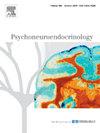Brain activity during working memory in patients with autoimmune Addison’s disease
IF 3.4
2区 医学
Q2 ENDOCRINOLOGY & METABOLISM
引用次数: 0
Abstract
Autoimmune Addison’s disease (AAD) is treated with daily oral hormone replacements for cortisol and aldosterone. The current treatment is sub-optimal, and frequently results in supra- and infra-physiological cortisol levels that might negatively affect the brain and cognitive functioning. It is currently unclear if the brains of these patients need to be better protected. The present study investigates brain function during working memory in young adults with AAD compared to healthy controls. All participants (56 AAD (33 females), 62 controls (39 females), 19–43 years), underwent MRI brain scanning while performing a visuo-spatial and verbal working memory task. No main group differences in accuracy, reaction time or brain activity during the tasks were found. These findings suggest that patients perform equal to controls, and achieve similar levels of brain activity during working memory. However, variations in the patient population may have confounded this outcome. Controlled studies on larger cohorts are therefore needed to confirm these findings and test if having AAD affects the brain on the long term.
自身免疫性阿狄森氏病患者工作记忆期间的大脑活动
自身免疫性阿狄森氏病(AAD)的治疗方法是每天口服皮质醇和醛固酮激素替代品。目前的治疗效果并不理想,经常会导致皮质醇水平超过或低于生理水平,从而对大脑和认知功能产生负面影响。目前尚不清楚这些患者的大脑是否需要得到更好的保护。本研究调查了与健康对照组相比,患有注意力缺失症的年轻成年人在工作记忆过程中的大脑功能。所有参与者(56 名注意力缺失症患者(33 名女性),62 名对照组患者(39 名女性),19-43 岁)在执行视觉空间和语言工作记忆任务时都接受了核磁共振脑部扫描。结果发现,患者在准确性、反应时间或大脑活动方面均无明显差异。这些研究结果表明,患者的表现与对照组相同,在工作记忆过程中的大脑活动水平也相似。然而,患者群体的差异可能会影响这一结果。因此,需要对更大的群体进行对照研究,以证实这些发现,并测试患有急性脑缺氧症是否会对大脑产生长期影响。
本文章由计算机程序翻译,如有差异,请以英文原文为准。
求助全文
约1分钟内获得全文
求助全文
来源期刊

Psychoneuroendocrinology
医学-精神病学
CiteScore
7.40
自引率
8.10%
发文量
268
审稿时长
66 days
期刊介绍:
Psychoneuroendocrinology publishes papers dealing with the interrelated disciplines of psychology, neurobiology, endocrinology, immunology, neurology, and psychiatry, with an emphasis on multidisciplinary studies aiming at integrating these disciplines in terms of either basic research or clinical implications. One of the main goals is to understand how a variety of psychobiological factors interact in the expression of the stress response as it relates to the development and/or maintenance of neuropsychiatric illnesses.
 求助内容:
求助内容: 应助结果提醒方式:
应助结果提醒方式:


